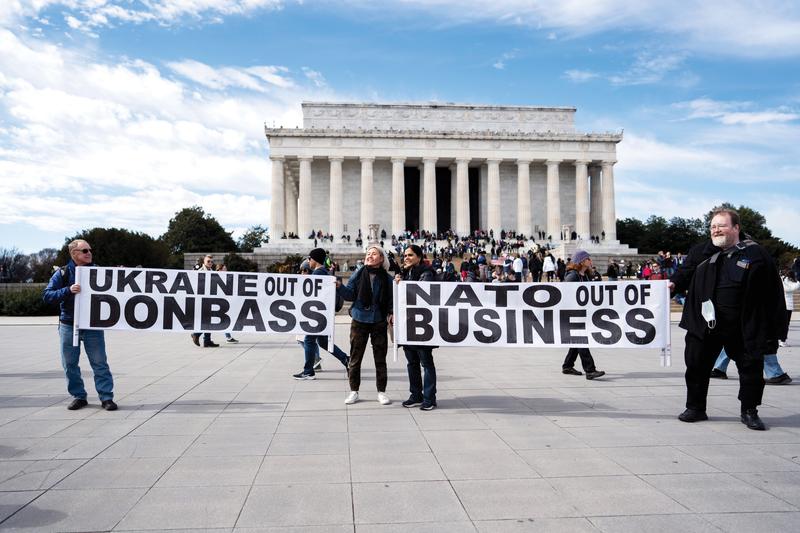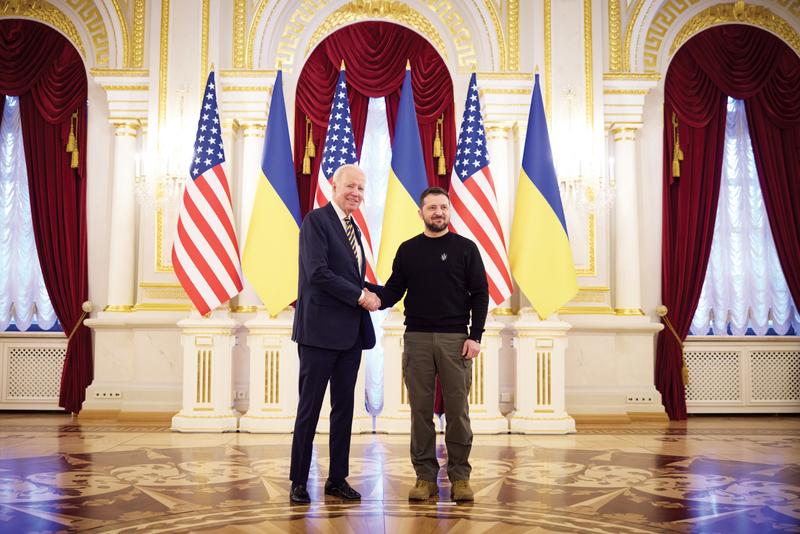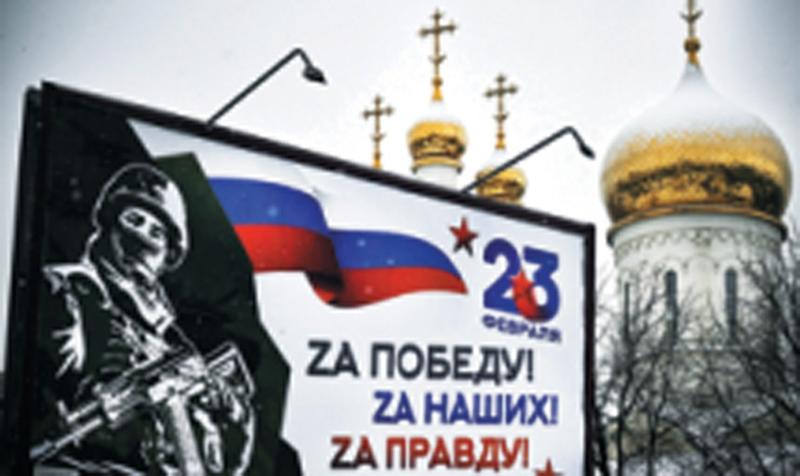A year on, signs point to worsening conflict as US, allies offer more arms to Kyiv in bid to curb Russia
 Hundreds of people protest in Washington on Feb 20 in one of the largest anti-war demonstrations in the United States in decades, calling for early end to the Ukraine conflict via dialogue and negotiations among other demands. (PHOTO / XINHUA)
Hundreds of people protest in Washington on Feb 20 in one of the largest anti-war demonstrations in the United States in decades, calling for early end to the Ukraine conflict via dialogue and negotiations among other demands. (PHOTO / XINHUA)
Editor’s note: As Feb 24 marks the one-year anniversary of Russia’s special military operation in Ukraine, China Daily is reviewing how the conflict has reshaped geopolitics, impacted the global economy and aggravated the energy crisis.
The yearlong conflict between Ukraine and Russia is showing dangerous signs of escalation, evidenced by US President Joe Biden’s pledge to support Kyiv for “as long as it takes”, prompting concerns among observers including the chief of the United Nations.
UN Secretary-General Antonio Guterres warned on Feb 22 that an escalation of the conflict in Ukraine is “a clear and present danger”.
“Over the past year, not only have we seen suffering and devastation grow, it is also becoming more evident just how much worse it could all still become. The possible consequences of a spiraling conflict are a clear and present danger,” Guterres told a resumed emergency special session of the UN General Assembly.
The conflict in Ukraine is fanning regional instability and fueling global tensions and divisions, while diverting attention and resources from other crises and pressing global issues, he said.
“Meanwhile, we have heard implicit threats to use nuclear weapons. The so-called tactical use of nuclear weapons is utterly unacceptable. It is high time to step back from the brink,” the UN chief said.
Guterres called for peace, saying that people in Ukraine are suffering enormously. Ukrainians, Russians and people far beyond need peace, he said.
“While prospects may look bleak today, we must all work, knowing that genuine, lasting peace must be based on the UN Charter and international law.”
The longer the fighting continues, the more difficult this work will be, he warned. “We don’t have a moment to lose.”
The 11th emergency special session of the General Assembly resumed on Feb 22 as the conflict between Russia and Ukraine approached its first anniversary on Feb 24.
 US President Joe Biden meets Ukrainian President Volodymyr Zelenskyy on Feb 20 in Kyiv, promising more military aid and support. (PHOTO / XINHUA)
US President Joe Biden meets Ukrainian President Volodymyr Zelenskyy on Feb 20 in Kyiv, promising more military aid and support. (PHOTO / XINHUA)
While the Russia-Ukraine crisis has left countless refugees in despair, caused tens of thousands of casualties and saddled the world with fuel and food problems, US weapons manufacturers have reaped enormous gains and US energy companies and farm sector have also scored increased sales in the past year.
On Feb 20, Biden made an unannounced visit to Kyiv, promising more military aid and vowing to support Ukraine for “as long as it takes”.
A day later in Warsaw, he drummed up support for Ukraine to tap potential of NATO allies in Washington’s vow to at least “weaken Russia”.
Biden vowed that his country and its allies “will not tire” of supporting Ukraine and emphasized the US commitment to NATO’s collective security, while his Polish counterpart Andrzej Duda called on European nations and NATO to show solidarity with Ukraine.
Russian President Vladimir Putin has accused the US-led NATO’s constant expansion to Russian doorstep as a breach of promise and a threat.
Now 12 months into the crisis, the risk of prolonged conflict appears to have become a reality on the ground with more weaponry from NATO, prompting calls for an early settlement of the issue.
“The United States has said repeatedly that we are going to continue what we are doing, which is arming Ukraine for as long as it takes, but we never defined what it is,” Chas W. Freeman, former US assistant secretary of defense for international security affairs, told China Daily.
“The impact of this (conflict in Ukraine) on the world is too great — food shortages, energy shortages, supply chains being broken, people being killed, people starving. This has to end,” said Freeman, now a senior fellow at the Watson Institute for International and Public Affairs.
Resolving the conflict is a delicate diplomatic task that cannot be accomplished quickly, he said.
“But perhaps, if the UN, with the international community acting through the UN, appoints a mediator or a group to mediate this, we can start addressing these two tasks: Ending the war and redesigning European security architecture,” Freeman said.
 A poster dedicated to the Defender of the Fatherland Day, in Moscow, on Feb 20. Russia celebrates Feb 23 annually as Defender of the Fatherland Day. (PHOTO / AFP)
A poster dedicated to the Defender of the Fatherland Day, in Moscow, on Feb 20. Russia celebrates Feb 23 annually as Defender of the Fatherland Day. (PHOTO / AFP)
Cal Jillson, a political scientist and historian at Southern Methodist University, Dallas, said the conflict does not seem poised to end any time soon.
“Its length from here is likely measured in many months, if not years. Given Western support, Ukraine has the will to hold out, and Putin shows no willingness to retreat,” he said in an email interview. “Hard to see any real winners here. No peacemakers in sight.”
The US and its allies have imposed unprecedented economic measures on Moscow. Russia is now the world’s most sanctioned country, with more than 5,500 measures aimed against it.
However, one year later, Russia has remained more resilient than many expected, thanks to its oil and gas exports, and deft maneuvering by its central bank and other entities.
Quick countermeasures by Russia’s central bank soon restored a measure of stability. Officials closed down stock markets, forced the main interest rate to 20 percent, and imposed restrictions on currency exchange, withdrawals and hard-currency transfers overseas. The measures reversed the ruble’s slide.
Janis Kluge, an economist at the German Institute for International and Security Affairs in Berlin, forecasts that Russia’s budget deficit could reach 5 percent of GDP this year, compared with 2 percent last year, due to the drop in energy exports and the rapidly falling tax receipts from the declining economy.
The European Bank for Reconstruction and Development lowered its forecast for Russia’s economic growth this year to 3.5 percent.
In other news related to the Ukraine crisis, the Japanese foreign ministry on Feb 22 denied that it issued a statement a day earlier condemning Russia.
Japan did not issue such a statement, and the US State Department “mistakenly” sent a Group of Seven (G7) foreign ministers’ statement, presumably from October 2022, to the press, according to the ministry.
Xinhua contributed to this report.


